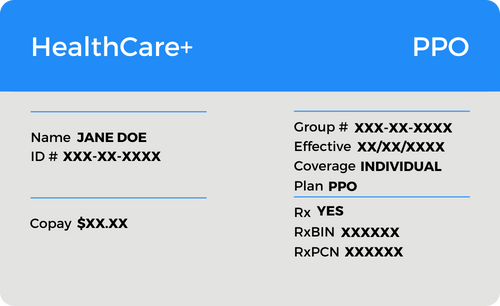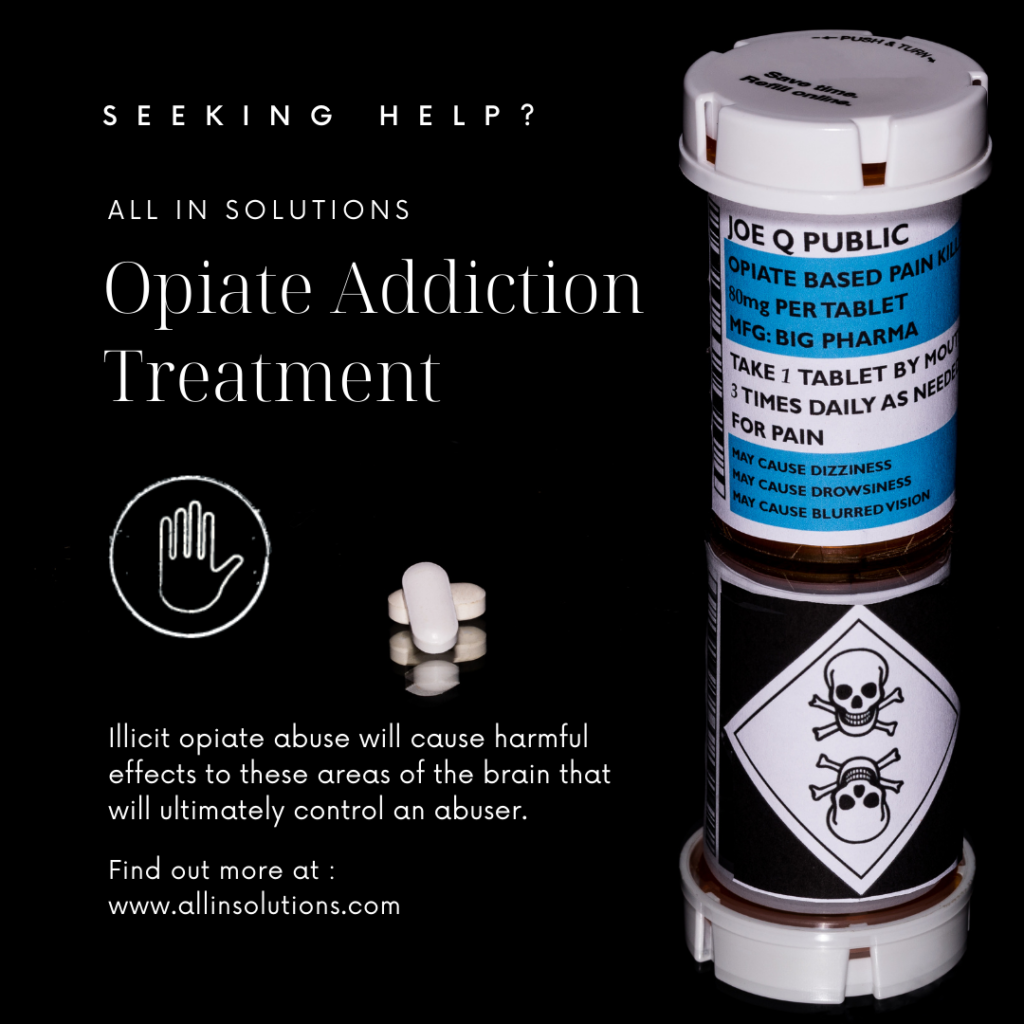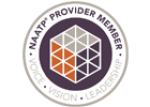Illicit opiate abuse will cause harmful effects to these areas of the brain that will ultimately control an abuser.
Opiate Addiction Treatment Recovery Center
All In Solutions
Opiate Addiction Treatment Centers - Opioid Treatment Program - Opiate Recovery Center
Understanding opiate addiction is an important first step in discovering addiction treatment options. Before jumping to conclusions about what kind of drug rehab program might be most beneficial, it is helpful to understand the physical, psychological, and emotional components that make up opioid use disorder. While many people assume that recreational drug abuse is the only way a person can become opioid dependent, this is simply not the case.
Similar to heroin, opiates are derived from poppy plants. Poppy plants produce opium and have addictive properties. Opium is commonly used in narcotic prescription medications and should only be taken as instructed by a medical professional. However, opiate abuse has become a frequent issue in the United States and opioid drugs are often obtained illegally leading to massive spikes in opioid overdose.
Within the body, opiates are connected to our natural opioid receptors, manipulating our perception of pain. Thus, causing euphoric sensations that our bodies crave.
The brain and nervous system are affected substantially. The main areas of the brain that are affected include:
- • The Brain Stem: Controls our automatic body rhythms (i.e., breathing, sleeping, heart rate)
- • The Spinal Cord: Transmits sensations throughout the body
- • The Limbic System: Behavioral and emotional responses
Compassionate Treatment For Opioid Dependence
Opiate Withdrawal Symptoms
When opiate abusers abruptly stop using, neurological responses are immediate and harsh. Lack of opiates on the opioid receptors causes the nervous system to produce internal endorphins at an abnormal rate. This ultimately causes withdrawal symptoms. Withdrawal begins within 48-72 hours of last use and end, depending on the abuse frequency. Opiate abusers experience various withdrawal symptoms that are physical and mental.
Physical Withdrawal Symptoms
- Restless leg syndrome
- Muscle, bone, or joint pain
- Insomnia
- Diarrhea and Vomiting
- Abdominal cramping
- Body aches
- Restlessness
Psychological Withdrawal Symptoms
- Anxiety
- Depression
- Distorted thinking
- Psychosis
- Impulsiveness
- Irritability
- Racing Thoughts
- Lack of Concentration
Opiate detox symptoms are managed with the proper dispensation of several drugs to minimize the physical sensations of withdrawal. Some examples of commonly used medicines include clonidine, naltrexone, suboxone, and methadone, which may only be administered in a licensed drug addiction treatment center. These medications are merely examples and do not reflect the specific drug used for any individual’s opiate detoxification.
Proper medications can help alleviate the withdrawal symptoms that occur from opiate abuse. Common medications include methadone, clonidine, naltrexone, and suboxone. These medications above are only examples and only relate to individuals when diagnosed and prescribed by a medical professional after assessing the individual’s case at hand. All In Solutions provides the stepping stones for finding the proper care now and moving forward.
Get The Help You Need To Overcome Addiction
All In Solutions Opiate Addiction Treatment Program Can Help You Regain The Life You Deserve
Get HelpOpiate Detox
Opiate withdrawal can be managed with the proper medications that help alleviate difficulties due to psychological and physical withdrawal. A licensed medical professional will need to evaluate and monitor each patient during their detox process to receive the right treatment. At All in Behavioral Health, we offer 24-hour, 7-days-a-week treatment by medical staff and behavioral technicians. This will help you feel comfortable and safe during this difficult time. Through proper detoxification and treatment, your journey back to sobriety will be complex but life-changing.
At All in Solutions, our 24-hour, 7-day-a-week medical staff is available to help you move through the opiate detox process with all the attention you require. Your journey back to recovery begins with the correct detoxification program followed by a drug addiction treatment program.
Your Insurance May Cover Addiction Treatment
Did you know that most health insurance plans provide coverage for substance use disorder treatment? Submit your policy information below for a free, confidential review of your benefits. All In Solutions accepts most health insurance plans.

Opiate Addiction Treatment Centers - Opiate/Opioid Addiction
After the detoxification phase, opiate abusers must seek additional help through an inpatient facility. This will help individuals build a sober network and clear mind when returning to their home environment. Addressing physiological and mental health issues will decrease the chances of relapse and give each individual an opportunity to work on their underlying issues.
All In Solutions Opiate Recovery program and our opiate addiction treatment centers take each instance on a case by case basis as each individual’s needs have to be adequately taken into consideration. Therefore, we respect each individual’s needs to help them live a better life in sobriety. Opiate addiction treatment combines complex therapeutic practices, 12-step programs, and recreational activities with peers.
All in Solutions enables you to make a seamless transition from detoxification straight into our inpatient treatment programs. Our programs are custom-tailored to your specific needs and drug addiction. Opiate addiction treatment includes individual and group therapy, 12-Step programs, recreational activities, spiritual activities (if desired), and more.
Overall, our core mission is to help each individual receive the care and compassion that was once given to us.
Get the Help You Need Today

Opiate Rehab Levels of Care
Inpatient Rehab – Inpatient treatment, also known as residential treatment, entails patients staying in a facility for significant periods of time to get treatment. Partial Hospitalization Programs (PHP) are typically the next level of care after detoxification and stabilization in a residential setting. PHP is where the true healing occurs for the mental health components that can impact opiate recovery.
This level of treatment is intended for persons who are just starting their recovery. Maybe they don’t know how to cope, have mental health issues that make them more inclined to abuse drugs, or are recovering from an overdose. The most intensive form of therapy is inpatient treatment.
Outpatient Rehab – After completing a residential treatment program, most people will continue their treatment in an intensive outpatient program (IOP). IOP continues to provide patients with a high level of supervision and assistance as they make the transition back to normal life. While still living at home, patients can continue to attend treatment and meetings on a daily basis.
An IOP does not require that a person begin treatment in a residential facility. Because residential therapy is not practical for everyone owing to job or family commitments, it may be beneficial for someone who still need extensive assistance or does not have a strong support network at home.
Outpatient Addiction Counseling – Even if a person is making progress in their recovery, they will need to meet with a counselor or therapist on a regular basis to hold them accountable and offer them with support. Hopefully, their therapist has been with them throughout therapy and will be a rock for them as they face each recovery obstacle.
Addiction is accompanied by other mental health or drug use issues in more than 9 million US individuals, or numerous mental health disorders overlap. A co-occurring disorder is what this is known as. Statistically, drug addiction and mental health issues go hand in hand, whether a person develops mental health problems as a result of substance abuse or as a result of substance abuse.
A person battling with addiction might benefit from regular visits to a counselor or therapist to help them manage their mental health.
Specialized Addiction Programs
Medication Assisted Treatment (MAT) – Opioid addiction is one of the most difficult addictions to recover from partly because of the profound impacts this class of drugs has on a person’s body and brain. In addition to this, because of the introduction of fentanyl and carfentanyl (up to 100x more potent than fentanyl) to the drug supply an opiate relapse can lead to overdose and death. Because of these factors, medication-assisted treatment programs have become increasingly popular.
Proven to be effective in reducing relapse rates and also in decreasing overdose rates in those that do relapse, medication assisted treatment programs utilize medications like Suboxone, Methadone, or Vivitrol to help minimize post-accute withdrawal symptoms and curb cravings in recovering addicts.
Faith-Based Recovery Program – Since the early 1930’s, even before the program now know as Alcoholics Anonymous was founded, recovering addicts and alcoholics have recognized the power that faith in a higher power can have in transforming their lives. Christian drug rehabs and faith-based recovery programs have built on this idea by utilizing Biblical teachings and spiritual principles to supplement the reconstructive program guided by the 12 steps.
In many faith based addiction programs, including the one offered at All In Solutions, Christian and 12 step elements are combined with evidence-based therapeutic practices to provide biological, psychological, social, and spiritual change.
Opioid Addiction Center FAQ
For many people struggling with opiate addiction, finding a Suboxone doctor or clinic can seem like a convenient and effective solution. While Suboxone will help to curb withdrawal symptoms giving a person a better chance at getting clean, there are non-physical components to addiction that are not addressed. Intensive counseling and therapy are necessary to get to the root of the problem, and outside of the accountability and safety of an inpatient rehab, opiate addicts are unlikely to follow through and stay on track in their recovery.
Just like Suboxone, methadone only solves (temporarily) the physical problem of addiction. Without addressing the mental health conditions that contibute to a person’s addiction, they have little chance of long-term success. In addition, methadone has an extremely long half-life making it very long and painful to detox from.
Yes, tons of research definitively concludes that rehab is effective. That being said, it’s worth noting that this questions is a little deeper than it looks. First of all, whether or not rehab works depends on your definition of success. If a patient goes to rehab and then stays sober for 15 years before relapsing, was that treatment successful? That is for you to decide. However, scientific evidence supports that rehab is effective in producing long-term sobriety as well as reducing the occurences and severity of relapse in the patients who do not stay entirely abstinent.
A patients length of stay is dependent on their needs and their progress during treatment. At All In Solutions, we will work with you to provide an individualized treatment plan that will work for you and get you home as soon as you are ready.
The cost of rehab depends on the program and your insurance provider. In some cases, addiction treatment is entirely covered by health insurance. To get a better idea of the out-of-pocket cost of treatment at All In Solutions, give us a call or visit our scholarship and insurance verification page.
The level of care you choose should be whatever is recommended by professional clinicians. When you call All In Solutions, we will perform an assessment on the phone which will be reviewed by our medical and clinical team. Based on your substance use and mental health history, they will recommend a level of care that will best meet your needs.
To get started, simply give us a call! Our admissions team will collect your health insurance and demographic information to assess any financial responsibility you may have. After that, you will complete an assessment that will be reviewed by our clinical and medical team so that we can identify a treatment plan that is likely to work for you. Once you are approved for admission, our admissions team will help you come up with a plan to tie up any loose ends like speaking to your employer or family, and plan your intake.
Start Your Journey To Recovery
Our Locations
All In Solutions Counseling Center
PHP & IOP in Boynton Beach, Florida
All In Solutions Counseling Center Cherry Hill
PHP & IOP in Boynton Beach, Florida
All In Solutions Wellness Center
Detox & Residential in West Palm Beach, Florida
All In Solutions California
PHP & IOP in Simi Valley, California
All In Solutions Detox
Detox & Residential in Simi Valley, California




